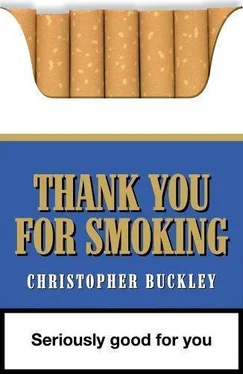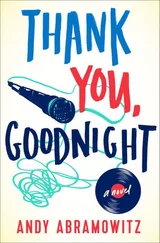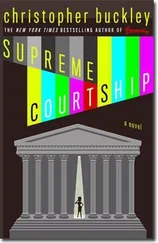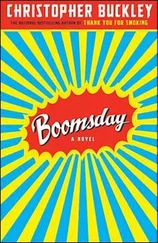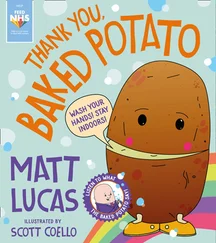"They cut off my medical insurance," Nick said into his black coffee. "Do you know how hard it is to get medical insurance when your previous place of employment was the Academy of Tobacco Studies?"
"Do you need health insurance if you're a federal prisoner?" Polly said. Polly, herself fleeing reporters, was in elegant mufti, sunglasses, and shawl. She looked like a cross between Jackie O and Mother Russia. And with the sunglasses, in this dark, she kept knocking things over.
"No," Bobby Jay said, stirring his coffee with his hook. "Prisons have their own doctors. Naturally, they're very highly qualified, all from Ivy League medical schools."
"Could we not talk about this," Nick said morosely.
"I'm sure it won't come to that," Polly said, touching his arm.
"That's what everyone's been telling me. Like, I might get really lucky and end up on a converted military base in a desert for ten years. It's a very consoling thought."
"Sounds a whole lot better to me than Lorton," Bobby Jay snorted. Lorton was the prison in Virginia where they sent the overflow hard cases from the D.C. jails. It enjoyed a reputation as a not particularly nourishing environment, especially for inmates of the Caucasian persuasion.
"You're not going to Lorton," Nick said, annoyed by the attempt at one-downmanship. "You're a handicapped Vietnam vet, it's a first offense. You'll get six months, suspended. So please, spare me the Ballad of Reading Gaol."
"Oh yeah? Then how come the lawyers tell me the prosecutor is just itching to put me away? First, I'm white, secondly, I work for the most hated lobby in America—"
"Whoa. The gun lobby is not the 'most hated lobby in America.' Do I need to remind you that I am personally responsible for the deaths of over half a million people each year, whereas you are barely responsible for thirty thousand—"
"Oh, Jesus," Polly said.
"I'm sorry," said Nick. "I'm not in a good mood right now." "How odd," Polly said.
"The Captain's funeral is tomorrow. I've been told in no uncertain terms that I'm not welcome. And guess who's giving the eulogy." He shook his head. "BR."
As the sweat pooled inside his fake beard and fake nose, Nick reflected that it was a good thing the Captain had asked to be buried up in Roaring Gap, where it was a little less infernally hot than Winston-Salem. It was sweltering inside the Baptist church, and jam-packed. Nick's rubber nose felt like it was going to drop off and the pinched, elderly woman sitting next to him was already looking at him strangely.
There were reporters in the back, some from the national press. The Captain's passing, amidst the kidnapping scandal, was being played as The End of an Era.
whither tobacco?
BR had just taken the pulpit.
"Doak Boykin," he began, "strode the world of tobacco like the colossus he was. He would give you the shirt off his back. He was, truly, the salt of the earth."
God, who'd written this swill for him? (Jeannette.) Vilified in his autumnal yean, his heart patched with parts from barnyard swine, and now eulogized by a Judas with a fondness for cliches. The man deserved better, even if he was a mass murderer.
"He was a man who believed in the Constitution of the United States of America, especially the parts about individual liberties and the right to the pursuit of happiness."
That was in the Declaration of Independence, but never mind.
"I think everyone gathered here would agree that, these days, it takes courage to stand up to the politically correct and the sanctimonious, who are trying to destroy a perfectly legal American product."
A deft bit of self-praise. Murmurs of approval.
"And the Captain had that kind of courage, in spades. I also know that many of you agree that he would have been saddened by the recent events in our own backyard. If there was a silver lining to his far too premature parting, it was this — that he will not have to endure the slings and arrows of misfortune that his misguided, overambitious, and perhaps mentally ill protege has brought down on our house."
The entire tobacco establishment, the heads of the Big Six — his new peers, now that he had completed his climb up from the world of vending machines — were all sitting in the front pews. And now he was distancing himself from Nick by making it clear that he had been the Captain's Frankenstein monster.
"Suh? Suh?"
It was the woman next to him, hissing: "Would you mind not growlin'? And there is something very wrong with your nose."
The Captain had been cremated — a brave choice, Nick thought, for a tobacco man; the press would have a good snigger over that— and his ashes scattered at the lake, from where he'd called Nick many times on his cellular while casting for one of the big ones.
The crowd along the shore for the scattering was deep, but Nick, being tall, was able to see from the rear. The Captain's family were all standing on the wooden pier: his wife Maylene and seven daughters, Andy, Tommie, Bobbie, Chris, Donnie, Scotty, and Dave, all in hats and dabbing at their eyes with lace hankies. The Captain's ashes were in a large silver cigarette box, a nice touch.
The minister, a squat, pink man in robes, read what the program said had been the Captain's favorite Old Testament passage.
"And Nahar did go unto the place of Gunt, who had been unrighteous and split the tongue of Nahar's brother, Rehab, with a rock. And he did say to him, 'Thou boil and pestilence,' and did strike a flint on the rock, which madeth a spark, with the which he set fire to the hem of Gunt's tunic, and Gunt did flee, quickly, out of the land, for he was on fire. And Nahar said to his brother, Rehab, 'Now thou seeest that smoke and fire are good and have their purpose. And Rehab sayest, 'Yeth.' "
"A-men," said the assembled.
"And now," the minister said, "we commit his ashes to the deep.."
The man standing next to Nick said to his wife, "Ain't but four foot deep theah."
"Hush," his wife said.
". where they await in hopes of eternal resurrection. "
As he spoke, the silver cigarette box with the Captain's ashes was passed from daughter to daughter, who each spooned out a little bit of old dad into the lake and passed it on to the next. It was very touching.
Nick felt a firm, gripping hand on his bicep. He spun around and saw a sheriffs deputy, young, meaty, and with a big semi-auto pistol handle protruding from its holster. Over the cop's shoulder, Nick saw the pinched, elderly woman pointing out Nick to someone.
"You Nick Naylor?"
"Uh. "
"Sir, we have been advised by the FBI to take you into custody. Would you come with me?" He tugged.
Shit, thought Nick,
disgraced protege arrested at mentor's funeral; new charge is added to list: bail violation.
He followed, awaiting the now-familiar snap of steel around his wrists.
Suddenly a man was at their side.
"Officer," he said in a commanding voice. He flashed a badge. "Raleigh FBI. Good work, deputy. I'll take it from here."
The deputy beamed and relaxed his grip, releasing Nick into the custody of — Gomez O'Neal.
Nick that he did it in full view of the mourners. He even put his hand on top of Nick's head as he put him into the back seat of the car, just the way real cops do.
"I thought you might pull a stupid stunt like attending the funeral," Gomez said, "so I brought along a badge from my collection. How come you violated your bail for a second time?"
"I love North Carolina. Can we take off the handcuffs now? You put them on tight. I'm losing circulation."
"Maybe I ought to leave 'em on." A strange sense of humor, Gomez.
He drove for an hour, not saying much, in the opposite direction of Raleigh, then went onto back roads and pulled over at a roadside dive called Mudd's, where the menu offered hot fried catfish and iced tea. The catfish came on newspaper, the iced tea came in mason jars.
Читать дальше
